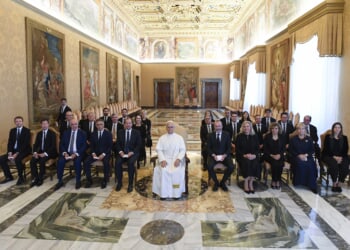Sir Simon Clarke served as Secretary of State for Levelling Up, Housing and Communities and as Chief Secretary to the Treasury. He represented the “Red Wall” seat of Middlesbrough South and East Cleveland 2017-24.
As a lifelong Middlesbrough fan, I know first-hand how important our club is to everyone on Teesside.
We’ve not always had the European nights of the mid-noughties to enjoy, but across generations, we’ve been blessed with great footballers like Juninho and Mannion, or Clough and Mowbray, both as players and in the dugout. But the importance of Boro goes far beyond what happens on the Riverside pitch. For Teessiders, it’s a defining part of our community, bringing us together for a common cause and embodying pride in place.
And as special as the Boro are to me and everyone I grew up with, I know communities across the UK have the same immense sense of pride in their own clubs. So, when you hear of clubs like Bury and Macclesfield Town going bust, or the crisis rapidly enveloping Sheffield Wednesday, I know exactly how much it must hurt fans in these towns and cities to see their club under threat.
This has never been as true as it is today. In our fractured society, football clubs bring us together. Their reach and impact is substantial, and this is central to our conservative values. Conservatism is about preserving our traditions, and our football clubs, rich in history and centuries old, are traditions we must protect. In so many places, football clubs are the very fabric of community.
Fans cannot switch to a neighbouring team if their club fails. Ties to these institutions stretch back generations, between neighbours, friends, and family. In economic terms, clubs are “non-substitutable goods”. Once a club is gone, there is no adequate replacement. That is why we must protect them by ensuring they are both properly funded through a fair share of the game’s huge proceeds, and owned and run in responsible fashion.
And this is where we come to the question of the Independent Football Regulator. I understand precisely why so many Conservatives are naturally sceptical of regulating business. Football is a successful industry – why should government get involved?
But the reality is that to fail to act poses an existential risk to clubs and communities.
The worst cases of all, of course, are the teams that are left to wither and die as the result of poor ownership. There have been some appalling examples in recent years. Beyond the teams that have actually gone to the wall, some giants have come desperately close, including the likes of Leeds and Portsmouth. Football itself has failed to solve these issues for decades. There must be some protections in place for such culturally important community assets.
But beyond safeguarding institutions that matter enormously, we also need to protect a key Conservative principle – that of free competition. Boro, much as it pains me, have spent 15 of the last 16 years in the second tier of English football, the Championship. The difference this means in revenue between the Premier League and the Championship cannot be overstated; it’s hundreds of millions of pounds. That creates a gap in competitiveness that is really difficult to bridge, even with a fantastic owner like Steve Gibson.
But the real horror of the situation comes from the “parachute payments” that cushion clubs for years after they are relegated from the Premier League.
Parachute payments are paid to the three clubs that go down each season, for up to three years – and they have become increasingly enormous. In 2014-15, the wage bill gap between parachute and non-parachute clubs in the Championship was £10.4 million; by 2023-24, it had soared to £43.3 million. In 2024-25, parachute clubs had playing squads worth an average of £157 million, compared to £19 million for the rest of the division.
This isn’t a level playing field, and it certainly isn’t sporting competition working as it should. Parachute payments have become “trampoline payments”, rocketing relegated teams back into the top flight. For each of the last six years, two of the three promoted teams have been parachute payment clubs. We risk ending up with a 24-25 team “closed shop” of clubs that dominate membership of the twenty member Premier League. And of course, that suits Premier League clubs just fine. They are not going to fix this nascent monopoly without intervention.
So protecting the integrity of competition is another key reason why the Football Regulator will add value. For the sake of all our communities, Conservatives should now give this regulator the time to prove its value. In Government, we should be proud that we introduced a solution to a broken status quo, offering supporters hope of a better, more sustainable future for English football, and that the foundations of our communities would be safeguarded for the future.
We made this commitment, we should continue to have faith in it and should not be afraid to remind people of our contribution to it.

















